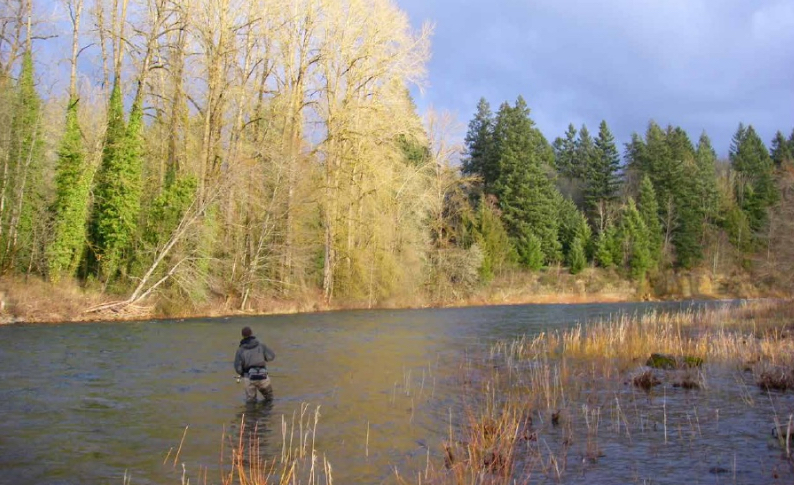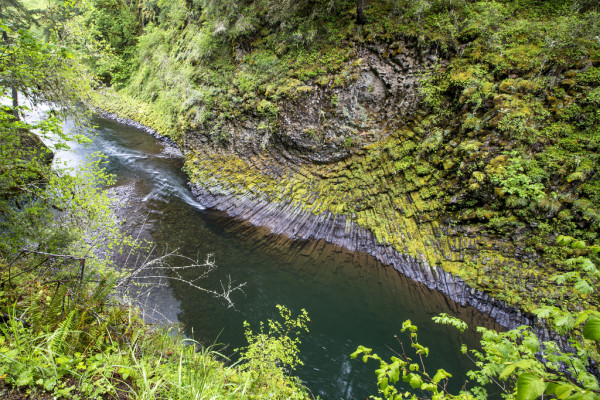Background:
The Molalla River has been treated as a timber mine and has suffered the consequences, however, the Table Rock Fork flows through a wilderness and this stream could be considered a reference stream for the entire watershed. Other threats include gravel mining, agriculture, water quality problems relating to temperature and sediment, water withdrawals, urban development, harvest management, hatchery releases, logging, sewage treatment discharge and more.
Non-native winter and summer steelhead have been released in this watershed, but those releases have been eliminated as the state attempts to comply with the Native Fish Policy and restore the wild winter steelhead, listed as a threatened species under the federal ESA. However, a naturalized summer steelhead population has established itself and presents a conflict with wild winter steelhead recovery.
Spring Chinook are native to the river, but the state still releases non-native spring chinook from Willamette River hatcheries. The spring chinook are listed as a threatened species in the Willamette and its tributaries, but the Molalla River may no longer have a wild, native run. To confirm this, a genetic inventory must be completed. If the native chinook population is not extinct, the goal is to eliminate the release of non-native fish and recover the wild spring chinook in the watershed.
Trout stocking has also been eliminated from this river in order to protect wild steelhead and chinook, however, the stream is still open to bait angling and this must be converted to a regulation that allows catch and release of trout using artificial lures only.
The Native Fish Stewards for the river are Terre Rogers, Tom Derry, and Daniel Labunksy who are busy learning the watershed and its fish populations. Through a joint project with the Oregon Department of Fish and Wildlife, the stewards are currently undertaking spawning surveys of winter steelhead and Spring chinook.
Recent Accomplishments - State Scenic Waterway

Photo: Ed Hepp
In 2016, Oregon’s Governor Brown officially designated 28 miles of new State Scenic Waterways in the Molalla and Chetco rivers, which are now protected from damming, dewatering and mining.
Our River Stewards, Mark Schmidt on the Molalla, and Sunny Bourdon on the Chetco worked with staff and rallied their community members and local businesses to support new these new protections.
After rounds of public meetings and comment opportunities, the final tally resulted in a full 99% of the comments received by the Oregon Parks and Recreation Department favoring State Scenic Waterways for both the Chetco and Molalla. The Clackamas and Curry County Commissioners also roundly supported the designation of both rivers.
In total, Oregon’s system of State Scenic Waterways now protects 21 river miles and one mountain lake for a total of 1,177 stream miles.
You can read the Molalla State Scenic Waterway Management Plan here.
And the Chetco State Scenic Waterway Management Plan here.
Achievements:
2003: Stopped a proposed gravel mine in the river’s floodplain;
2005: Replaced fish barrier culvert with a fish-safe bridge that opened 8 acres of Wetlands to salmonid rearing;
2006-2009: Received grants from NMFS to maintain fish enhancement projects on river;
2008: Was founding member of Molalla River Alliance, a community-based conservation group working to restore ecosystems and maintain clean water. Also supported MRA’s efforts seeking U.S. Congressional approval to designate more than 21 miles of the Molalla as a Wild and Scenic River.
2008: Successfully affected angling regulations which (a) moved salmon and steelhead fishing boundary to protect vital spawning and rearing habitat, and (b) removed the use of bait on the river for 10 months of the year.
2008: Placed new angling regulations signs throughout river;
2009: Began temperature monitoring program on the Molalla River;
2009: Drafted recovery actions for Molalla River winter steelhead and spring Chinook salmon that were incorporated into the Upper Willamette Conservation and Recovery Plan (approved in 2011);
2005-present: Led community-based campaign to stop city of Molalla from discharging treated sewage into the river. Reached financial settle with city for ten years of violations of the Clean Water Act;
2005-present: Conduct annual spawning surveys of winter steelhead and spring Chinook;
2005-present: Deposit 10,000 hatchery salmon carcasses for nutrient enhancement of the river;
2005-present: Support twice annual river cleanups, trail enhancement and environmental education in partnership with local Watershed Council;

